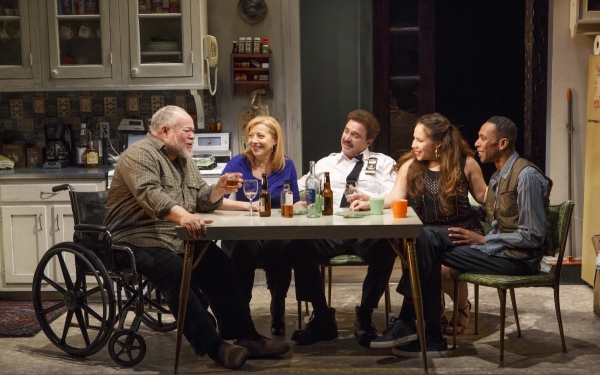
(© Carol Rosegg)
When Stephen Adly Guirgis' Between Riverside and Crazy premiered last summer at Atlantic Theater Company, Eric Garner and Michael Brown were just entering the national consciousness. We had yet to see the mass #BlackLivesMatter protests that materialized across the country in response to the deaths of the two men at the hands of law enforcement. Upon reexamination, Guirgis' play about a black police officer and shooting victim feels eerily prescient. (It is now being remounted at Second Stage Theatre, with only negligible changes.) It's certainly far more insightful than any tweet, protest sign, or Internet thought piece could ever hope to be. Provocative, funny, and deeply heartfelt, Between Riverside and Crazy is a ballad of New York City sure to enter the pantheon of great American plays.
Ex-cop and widower Walter Washington (the brilliant Stephen McKinley Henderson) lives in a rent-controlled apartment on Riverside Drive with his son, Junior (Ron Cephas Jones, adroitly stepping into a cast that remains completely intact from the original run, spare this one role) and their two semipermanent guests: recovering addict Oswaldo (the simultaneously handsome and terrifying Victor Almanzar) and Junior's girlfriend Lulu (a very funny Rosal Colón). They all call Walter "Dad," even though only one of them is actually related to him. He's a sharp-tongued, quick-to-anger (but secretly indulgent) patriarch, who is perhaps too proud and stubborn for his own good.
Walter was shot by a fellow officer eight years back, effectively ending his career on the force. Since then, he's been pursuing a discrimination lawsuit against the NYPD. (Walter claims the offending officer shouted a racial slur as he shot him.) One night, Walter hosts dinner for his old beat partner Audrey O'Connor (a pitch-perfect Elizabeth Canavan) and her fiancé, Lieutenant Dave Caro (an appropriately smarmy Michael Rispoli). Caro stands to win a big promotion if he can convince Walter to settle with the NYPD, so he pounces on the opportunity. After all, it's an election year and the mayor is already facing heat over another wrongful shooting.
"Seems the department hasn't gotten any better at not shooting at innocent black men," Walter sneers eliciting knowing guffaws from the house. With razor-sharp diction and cadence, Henderson spends much of the play with the audience wrapped around his little finger, using the power of Guirgis' words to prod us into anger, joy, and despair. Amazingly, he maintains this hold even as we come to understand that the situation is not as black and white as it at first seems.
Yes, Walter was shot, but he was off-duty at the time (6am) in an after-hours bar populated by criminals. "Whose fault was it really? I can't answer that," remarks O'Connor in near hysterics. "But I know Delores, your wife, had an opinion on that subject." As delivered by Canavan, this invocation of Walter's late wife feels like so much salt in an open wound.
Director Austin Pendleton keeps us riveted on this ever-sprawling story, even as it seems to veer wildly off-course. The second-act arrival of a witchy Brazilian church lady (the sphinxlike Liza Colón-Zayas) takes the play in an unexpected but incredibly valuable direction. (A hitherto hyper-realistic play suddenly takes on magical undertones.) Pendleton helps us to see how the pieces fit together, with scenes often bleeding from one to the next.
Walt Spangler's mammoth rotating set (depicting the Washington apartment) helps to create these moments. He's had to condense the set for the smaller uptown stage, eliminating a half-bath and moving the furniture in tighter. This creates an overstuffed feeling appropriate for an Upper West Side apartment continuously occupied for several decades. A late scene in which the set continues to rotate as the actors move from room to room has a cinematic agility that is rarely achieved onstage.
One might be tempted to dismiss Between Riverside and Crazy as overly topical, a play that will quickly pass its expiration date as we move on from police brutality as a top story in the news. But the ever-increasing militarization of our law enforcement makes that seem unlikely. And even so, Guirgis has cast a wide thematic net. This expansively imagined story hits on issues of aging, parenthood, responsibility, pride, regret, and the inexplicable nature of salvation. This is one of those special plays that offers new rewards with each successive viewing.








